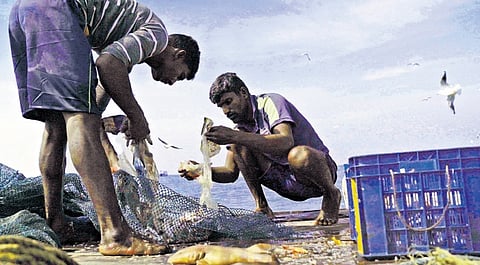

How does one show the adverse effects of climate change on-screen? It is one thing to observe the steep increase in temperatures and the alarming rise in seawater levels through animated visuals but can it be conveyed through the camera? For Sarvnik Kaur, director of the documentary Against The Tide (released recently on Mubi), telling the story of climate change was through looking at the lives of two Koli fishermen in Mumbai. “I realized that climate change actually looks like social, financial, and familial pressure,” she says.
However, it took her some time to arrive at that realisation. When she began working on the film, it was the idea of displacement that really intrigued her, being from a family that had experienced it first-hand. Her grandparents came from Pakistan at the time of the partition in 1947 and she had seen her parents’ home getting burned during the 1984 anti-Sikh riots in Delhi.
“A lot of your personal history gets lost in this process of political displacement and the trauma that it leaves behind for generations is immense,” she says. It was around 2015-16 that she started hearing stories of the Koli people getting displaced due to the coastal road project in Mumbai. “I wanted to make a film about the land belonging to the Koli people,” says Sarvnik.
That is how she began working with a fisherwoman’s collective and made some short videos to support their cause. She started going to protests and demonstrations along with the Koli women. It was during one such instance that she came up with a new perspective to approach her film. “I felt a certain desensitisation as I looked around and thought that people don’t have time to work on social causes,” she says, adding, “I realised that the language of protest doesn’t work. I should not approach the film as an activist but as a filmmaker and storyteller.” After that, she changed her outlook. “I freed myself from the baggage of being an activist.”
It was also through the protests that she met her protagonists, Ganesh and Rakesh, and started following their lives individually. Sarvnik observes the two from a distance as they interact with each other and look for ways to sustain themselves amidst the changing nature of the sea. The film is shot with a distinct gaze, where the filmmaker’s presence is not felt. It unfolds more like a fiction than a documentary, as there are no direct interviews with the subjects and at no point do they address the camera. Sarvnik was clear with her gaze right from the start.
“To imagine that as an outsider, I can go and make a narrative out of their lives because I am so creative and clever, was a folly that I didn’t want to fall into,” she says. What she wanted was not their consent for her presence, but rather an enthusiastic collaboration. “They were going through difficult moments and I didn’t feel the need to pick up the camera every time,” says Sarvnik. “So, there was no pressure between us. I never asked them for anything and in return, they gave me everything. That lent a certain non-transactional quality to the process,” she reveals.
Against The Tide won the Special Jury Prize at the Sundance Film Festival last year. Along with recent documentaries like All That Breathes, Writing With Fire, and While We Watched, Sarvnik’s film represents a new voice in Indian non-fiction filmmaking, which has been gaining accolades at film festivals worldwide. “It is good that we are making a space for ourselves,” she says. “It takes a village to make a film and to find your own is difficult.” Sarvnik feels that being a documentary filmmaker is like existing in a strange dichotomy. “On one hand, there is this god-like feeling that you can derive narratives out of thin air and at the same time, there is an absolute helplessness due to lack of support,” says the filmmaker.
A downside of the occupation, according to her, is that they are not given a salary. “Our product acquires value only when it is sold. Otherwise, it’s just unpaid free labour,” she says, adding that she is overcome with despair at times. “But then I remind myself that I am not doing a corporate job at least,” she quips. Sarvnik feels that challenging times are good for filmmakers. “We are a breed of troublemakers and we will keep finding new ways to move ahead,” she concludes.